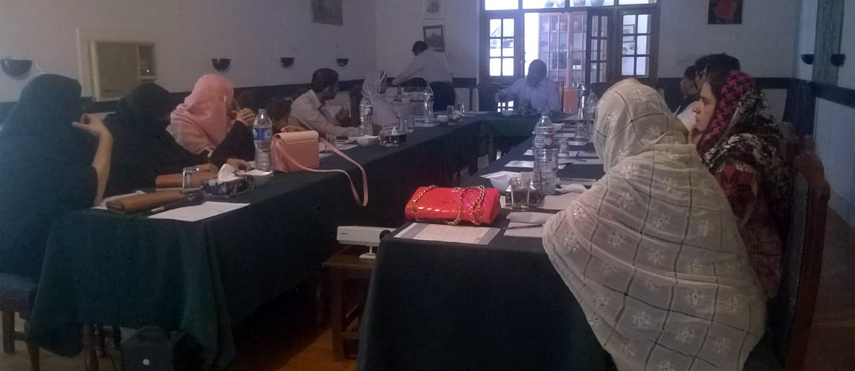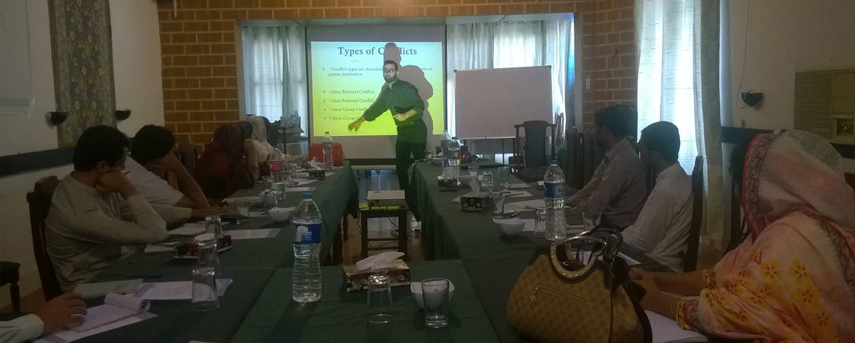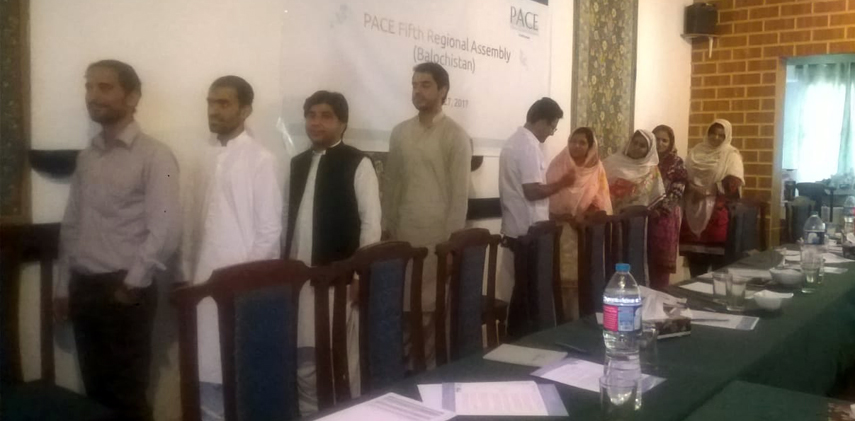EXECUTIVE SUMMARY
The Center for Research and Security Studies (CRSS) conducted the fifth one day PACE Regional Assembly on August 27, 2017, at Gardenia Resort, Quetta for young university lecturers and professors who were past participants of PACE Collaborative Workshops. The first regional assembly covered the region of Balochistan.
The objective of the regional conference was to reinforce the themes that were discussed during the past workshops and to learn from the experiences of speakers and participants in the current climate and volatility of Pakistan. The workshop was conducted under the umbrella of the Pakistan Center of Excellence (PACE), a counter-radicalization and pluralistic values focused project, in collaboration with the Dutch Government. Participants included young university lecturers and professors from all across the universities in Balochistan. Dr. Khalid Zaheer, religious scholar and Mr. Safiullah Gul, Bureau Chief Dunia News, Peshawar, were speakers to the session.
INTRODUCTION TO CRSS
CRSS is Pakistan’s first think-tank of its kind founded by civil society activists, committed to the cause of independent research and nonpartisan analysis to help people in and outside Pakistan better understand this nation of 180 million. The Center aims to contribute in building a Pakistan where every citizen has the opportunity to progress as far as his or her talent can take him or her. We believe in, and promote good governance, rule of law, accountability, and independent judiciary ´ elements that are fundamental to the country’s political and economic progress. Center for Research and Security Studies (CRSS) strives for a democratic Pakistan where all inhabitants are acknowledged as equal citizens without any racial, ideological, ethnic, religious, or sectarian discrimination.
INTRODUCTION TO PACE
Pakistan Center of Excellence (PACE) is a major CVE initiative by the Center for Research and Security Studies (CRSS) designed to trigger critical thinking through a discourse anchored in fundamental global values such as socio-political diversity, acceptance of diversity, rule of law and equal citizenry, as well as the rights afforded within Pakistan’s Constitution (articles 8-28). This landmark project is running with the support of the government of Netherlands.
PROCEEDING
The Center for Research and Security Studies (CRSS) conducted the fifth one day PACE Regional Assembly on August 27, 2017, at Gardenia Resort, Quetta for young university lecturers and professors who were past participants of PACE Collaborative Workshops. The fifth regional assembly covered the region of Balochistan.
Participants included young lecturers and professors from University of Balochistan, Quetta, Balochistan University of Engineering and Technology, Quetta, Sardar Bahadur Khan Women University, Quetta. Few participants were invited from Lasbela University, Lasbela and Turbat University too but because of the unavailability of flights they couldn’t attend the session.
Dr. Khalid Zaheer shared his experience and knowledge on how to end religious differences and promote inter-faith harmony. Mr. Safiullah Gul, a suicide attack survivor and Bureau Chief at Dunia News, Peshawar extended his views on communication skills.
OPENING CEREMONY
Ms. Farhana Kanwal, Project Coordinator, welcoming the participants to the workshop said that PACE workshops gather a diverse group of university teachers from all across Pakistan every month to pull together a wide spectrum of ideas. “Teachers are the real gate keepers of the society because they are shaping future generations and are greatly influencing the lives of their students in multifarious ways”, she said. Introducing the PACE project she said that it is an initiative by CRSS to counter radicalization, inculcate critical thinking, question preconceived notions and narratives, and embed a national discourse in constitutionalism and rule of law.
WORKSHOP CORE AREAS
The young professionals were trained in following areas:
- Leadership and motivation
- Equal citizenry and respect for rule of law
- Fundamentals of democracy, governance and accountability
- Respect for diversity, opinions and rights
- Rights of minorities and other marginalized groups
- Constitutionalism, and adherence to Pakistan’s Constitution, particularly articles 8-28
- The importance of asking critical questions in the pursuit of knowledge
Dr. Khalid Zaheer: Ending Differences
Dr. Khalid Zaheer started off his session on the topic of “Ending Differences”. He started his session by stating that one cannot simply end differences, we must be able to understand and accept those differences. By embracing each other’s strengths and weaknesses, we can learn from one another. He further stated that the purpose of diversity is to live together with differences therefore we should be open-minded to others opinions and beliefs. God himself has created each one of us with physical and psychological differences and has given us the freedom to think and behave as we deem fit.
He further stated that to have a difference of opinion is natural; it is important that we keep our conscience inside of us alive and show compassion towards others. We need to ask questions and confront people but we should be able to do that in a calm manner without hurting anyone. Our struggle for search of truth can only be tested if we have difference of opinion.
Dr. Zaheer through his interaction with the participants stated that we should never allow ourselves to be influenced emotionally. It can cloud our judgment and affect our behavior and attitude with others. Every person should accept the truth when it comes their way. We should not push our beliefs on anyone as God himself does not impose his will on us. We are expected from God to accept the truth but not by forcing anyone into our beliefs.
Religious tolerance is the right one should give to others to believe in and practice faith of their choice. We should be tolerant towards others way of life. We can’t impose our views on others and we can’t blame others for their beliefs and ideas. Religious tolerance is to allow others to have religious freedom and not pressurize anyone to change their beliefs. Our attitude toward others beliefs should be genuine and positive. Dr Zaheer concluded his session by stating that we should put ourselves in the position and consciousness of others and be compassionate regardless of our differences. Furthermore, he advised all the participants that being teachers, they should teach their students daily to critically question everything around them but at the same time, to speak to others in a peaceful manner.
Mr. Safiullah Gul: Communications Skills
Mr. Safiullah Gul started his session on communication skills and highlighted major factors essential for good communication. He also talked about the methods of non-verbal communication which relate to gestures, body language, posture, eye contact, appearance and symbols. He explained the often overlooked nonverbal behavior that holds more importance in communication than spoken words.
He elaborated the barriers to good communication as:
- Use of unfamiliar and technical terms
- Distractions
- Difference of opinions
- Physical disabilities and language differences
- Cultural differences
Mr. Safiullah Gul also began the session on conflict management by explaining that not all conflict is bad as it is just a matter of individual perception. A conflict, in essence can be positive or healthy giving individuals a chance to thresh out their preconceived ideas and opinions and this form of interaction can lead to coming up with a logical framework or understanding of a concept in the true spirit of harmony.
Conflicts are a part of life as where ever there are people, emotions vary while communicating. This gives rise to either conflict that can be easily resolved or leads to violence which is definitely not a solution to the answer.
Closing
Ms. Farhana Kanwal, in her closing remarks said that the objective of the regional assemblies is to recall the PACE themes and to create a critical mass of young leaders equipped with the skills to critically analyze issues, look at each other as equal citizens, and correct misconceptions about marginalized communities.
She said that we wish to have a more tolerant and respectful society that believes in equality and diversity. A society that respects everyone without any discrimination of religion, ethnicity, language or physical attributes.



